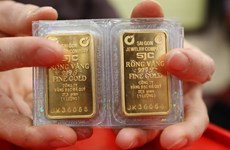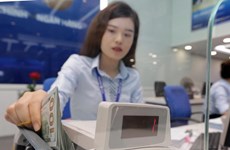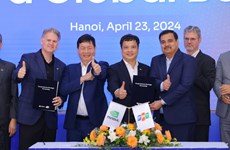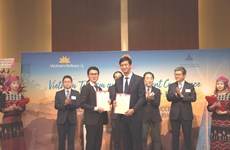Businesses urged to boost exports to RoK market
Vietnamese enterprises should make greater efforts to accelerate trade
promotion, improve production capacities and sharpen their competitive
skills to further tap into the lucrative Republic of Korea (RoK) market.
Vietnamese enterprises should make greater efforts to accelerate trade
promotion, improve production capacities and sharpen their competitive
skills to further tap into the lucrative Republic of Korea (RoK) market.
According to the Vietnamese Trade Office in RoK, the Korea Rural Economic Institute recently quoted a survey conducted by Hankook Research Co, which said that besides going to small and medium-sized supermarkets, Korean consumers also bought food at hypermarkets as well as traditional markets.
They also preferred environment-friendly foods and were paying increasing attention to the country of origin of foods, with top priority being given to Korean-made goods.
Thus, in order to successfully penetrate into Korean markets, Vietnamese exporters should ensure the quality of their products with a focus on food safety and hygiene as well as make their goods different from those already available in the market, the office said.
According to the office, Korea is currently one of the world's leading importers. Last year, the country spent 515.57 billion USD to import mainly crude oil, natural gas and coal along with machines, electronics and components. Steel and iron, as well as chemicals, were also imported.
Meanwhile, Vietnamese exports to Korea have also experienced significant growth in the past few years – from 12.9 billion USD in 2009 to 20 billion USD in 2012 and 27.3 billion USD in 2013, according to the General Department of Customs.
In the first half of this year, Vietnam exported over 3 billion USD worth of goods to the country. During the period, apparel took the lead in terms of turnover with 746 million USD, followed by seafood with 282 million USD and wood and wooden products (230 million USD). Computers and peripherals (156 million USD), mobile phones and components (164 million USD) and footwear (149 million USD) made up the rest of the exports.
The department noted that exports of Vietnamese agricultural goods and foodstuff to different markets were also increasing.
Trade experts attributed the encouraging results to efforts by domestic enterprises in exploiting the market and the positive influence of the ASEAN-Korea Free Trade Agreement, through which Korea offered tax incentives to goods imported from countries that are part of the pact.-VNA
According to the Vietnamese Trade Office in RoK, the Korea Rural Economic Institute recently quoted a survey conducted by Hankook Research Co, which said that besides going to small and medium-sized supermarkets, Korean consumers also bought food at hypermarkets as well as traditional markets.
They also preferred environment-friendly foods and were paying increasing attention to the country of origin of foods, with top priority being given to Korean-made goods.
Thus, in order to successfully penetrate into Korean markets, Vietnamese exporters should ensure the quality of their products with a focus on food safety and hygiene as well as make their goods different from those already available in the market, the office said.
According to the office, Korea is currently one of the world's leading importers. Last year, the country spent 515.57 billion USD to import mainly crude oil, natural gas and coal along with machines, electronics and components. Steel and iron, as well as chemicals, were also imported.
Meanwhile, Vietnamese exports to Korea have also experienced significant growth in the past few years – from 12.9 billion USD in 2009 to 20 billion USD in 2012 and 27.3 billion USD in 2013, according to the General Department of Customs.
In the first half of this year, Vietnam exported over 3 billion USD worth of goods to the country. During the period, apparel took the lead in terms of turnover with 746 million USD, followed by seafood with 282 million USD and wood and wooden products (230 million USD). Computers and peripherals (156 million USD), mobile phones and components (164 million USD) and footwear (149 million USD) made up the rest of the exports.
The department noted that exports of Vietnamese agricultural goods and foodstuff to different markets were also increasing.
Trade experts attributed the encouraging results to efforts by domestic enterprises in exploiting the market and the positive influence of the ASEAN-Korea Free Trade Agreement, through which Korea offered tax incentives to goods imported from countries that are part of the pact.-VNA













